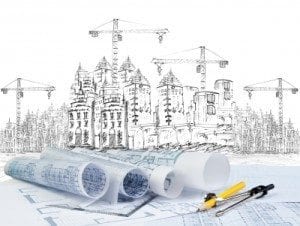MBTI® Test ISTJ Civil Engineers
Strong Interest Inventory® General Occupational Theme Code: Realistic, Investigative, Conventional (RIC) (GOT)
The daily tasks of an occupation can pair well with the qualities of persons’ Myers-Briggs Type Indicator® (MBTI test) personality types. For example, the analytical, structured, project-driven mental processes of a Myers-Briggs test Introverted-Sensing-Thinking-Judging (ISTJ) type often make them a good match for positions in civil engineering.

Image courtesy of khunaspix at FreeDigitalPhotos.net
Civil engineers are responsible for the design and structural integrity of a variety of public structures and buildings, including roadways, railroads, bridges, marine structures, waterways, pipelines, sewage systems, and other edifices. On top of designing the aesthetic and technical components of these structures, they also supervise their construction and maintenance.
Apart from their design productions, civil engineers also carry out a number of everyday tasks, such as supervising and instructing their staff during construction times, offering guidance about beneficial changes to their industrial peers, formulating budget estimates, conducting experiments on their materials, conducting mathematical analysis, providing reports to committees and councils, and analyzing factors that may hinder productivity.
Knowledge in several corresponding subjects contributes greatly to a civil engineer’s success. An exceptional knowledge of engineering principles, science, and technology is imperative, as is an overall artistic eye for design and experience using various design tools and techniques of the industry. An overall knowledge of mathematics, physics, and building methods and tools are also important. General mental processes such as critical judgment, problem solving, reasoning, and communication are also important in this occupation.
Civil engineers will often find themselves drafting designs for new structures, as well as prepping for the use of the materials and tools needed for construction, on an everyday basis. They are hands-on with their projects, communicating with those involved in order to ensure its success. Education-wise, civil engineers almost always need a Bachelor’s degree, and secondary degrees are encouraged.
-
MBTI® Career Report
Price: $62.95 Buy NowDIGITAL DELIVERY
- Receive an in-depth 10-page report on your occupational matches
- Explore your preferred work tasks, environments, and industry matches
- Assessment sent digitally within 2-3 business hours of purchase
Along with knowledge in different areas and subjects pertaining to engineering and drafting, there are tools that are often used in this occupation and therefore require a candidate to have basic abilities with them. These tools include electronic distance measuring devices, microfiche microfilm readers, drafting and rolling scales and triangles. In addition to using these tools, knowledge of technological software is often needed for this career. These software items include but are not limited to:
- Trimble Geomatics Office
- Auto CAD Software
- Bently MicroStation
- Eagle Point Site Design
- GIS Software
- Microsoft Project
- Microsoft Excel
Below are some employment trends for Civil Engineers:
- Median wage: $41.86 hourly, $87,060 annually
- Employment: 326,800 employees
- Projected growth (2018-2028): Average (4% to 6%)
- Projected job openings (2018-2028): 28,300
Visit Our MBTI® About Page and Our ISTJ Personality Type Page For Detailed Information on The ISTJ Personality Type
Visit Our Strong Interest Inventory® Resource Page To Learn About The RIC GOT
Click on one of these corresponding popular ISTJ Careers for detailed information including Career Stats, Income Stats, Daily Tasks and Required Education: Accountant, Air Traffic Controller, Aircraft Mechanic / Service Technician, Civil Engineer, Environmental Science & Protection Tech, Nuclear Power Reactor Operator, Security Guard, Supervisor of Correctional Officers, Tax Examiner / Collector / Revenue Agent, and Transportation Inspector.
Explore Our ISTJ Blog Pages
Explore additional information that delves deeper into the ISTJ Personality Type by examining various personality and career based subjects:
- Myers-Briggs test ISTJ Personality Type and Innovation Styles Blog
- Myers-Briggs test ISTJ Personality Type and Project Management Blog
- Myers-Briggs test ISTJ Personality Type Emotional Intelligence Blog
- Myers-Briggs test ISTJ Personality Type and Leadership Blog
- Myers-Briggs test ISTJ Personality Type and Communication Blog
Click on a link below to read more about different MBTI Personality Types
| ISTJ | ISFJ | INFJ | INTJ | ESTP | ESFP | ENFP | ENTP |
| ISTP | ISFP | INFP | INTP | ESTJ | ESFJ | ENFJ | ENTJ |
References:
- Bureau of Labor Statistics wage data and 2012-2022 employment projections Onetonline.org
- MBTI® Type Tables for Occupations, 2nd Edition. Schaubhut, N. & Thompson, R. (CPP, 2008)

